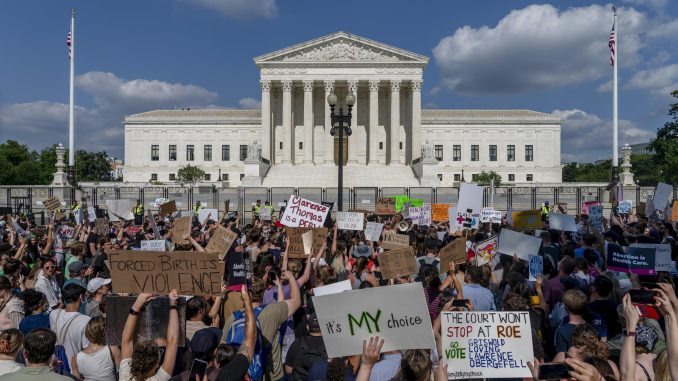
By Serin Sarsour
America was set back about 50 years when the Supreme Court reversed Roe v. Wade on June 24, terminating the constitutional right to get an abortion. This decision has left many at Brooklyn College feeling uncertain about how people all across the U.S. will be affected.
“I do not agree with the Supreme Court’s ruling because it is a violation of human rights,” said rising BC junior Amaya Hunt. “Telling women or anyone with ovaries they do not have the right to choose what happens with their body is extremely alarming and puts our other basic human rights in serious danger.”
In 1969, a woman from Texas named Norma McCorvey, also known by her pseudonym Jane Roe, wanted to end her unwanted pregnancy. However, at the time, women in Texas were only allowed to get an abortion if their lives were in danger.
Roe and her attorneys later filed a lawsuit against Henry Wade, the district attorney of Dallas County, on behalf of Roe and every other women who wanted to get legal and safe abortions. In a 7-2 decision, the Supreme Court legalized abortions across the U.S. on Jan. 22, 1973.
Fast forward almost 50 years, six out of the nine current members of the Supreme Court ruled to overturn Roe v. Wade, leading state legislatures to implement abortion bans that will impact about half of America’s states.
“This is arguably one of the biggest attacks on a right that was won in the past, in the past like 50 years. It’s a huge attack on our right to our bodies, and I think that it’s a basic right. I think abortion is healthcare. Healthcare is a right that we should all have,” said Tatiana Cozzarelli, a student at the CUNY Graduate Center, an adjunct at BC, and one of the founding members of the CUNY for Abortion Rights organization.
CUNY for Abortion Rights serves as a safe space where university staff, faculty, and students can fight for reproductive rights and against systemic problems that are intertwined with reproductive justice, such as sexism, racism, homophobia, transphobia, and others.
“This decision will impact America in extremely scary ways. Many women and non binary people will die because they do not have access to safe abortions,” said Hunt. “Whether it is because they are unable to physically carry the child safely, have been assaulted, or just do not want to have a child, losing the right to choose will kill many people.”
Although there are many against the illegalization of abortions, others agree with the Supreme Court’s decision to overturn Roe v. Wade. “I believe life starts in the womb. Only unless medically the woman needs to abort the child, then all means abort it. Other than that, I believe the choice starts in the act,”said BC junior Musa Esa.
On the other hand, others believe women should have complete control over their bodies since the Supreme Court’s ruling could also lead to other rights being revoked. “It may start a domino effect where various other laws and cases that protect human rights are overturned,” said Yahia Elhag, a BC junior.
In response to the Supreme Court’s decision to reverse Roe v. Wade, CUNY for Abortion Rights is currently in the process of making a list of demands that will be specific to the university regarding reproductive rights, requesting funds, healthcare that everyone at CUNY should have access to, along with academic and mental health resources.
Cozzarelli highlights that CUNY for Abortion Rights wants to support students and is open to their thoughts and suggestions. “If someone has an idea for something, what they want to do around reproductive justice, I think that’s something that we would support,” she said.
